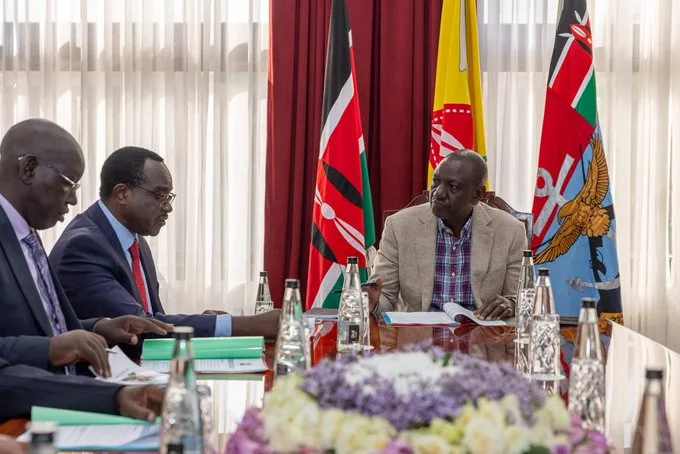How Ruto Plans to Register 15 Million Learners in Taifa Care Within 90 Days.
The government has expressed confidence in meeting its target of enrolling over 15 million learners from Early Childhood Development and Education centres (ECDEs), primary/comprehensive, and secondary schools into the Taifa Care health insurance programme during the first term.
Officials emphasized that all learners in both public and private schools are eligible for enrollment in the public health scheme.
Government representatives stated that Community Health Promoters had been directed to set up in learning institutions to ensure all students are enrolled before the end of the term in April.
This initiative distinguishes itself from the Sh4 billion EduAfya programme, previously under the now-defunct National Health Insurance Fund (NHIF), which only covered public secondary school students registered in the National Educational Management Information System (Nemis).
Reports from the Health Ministry and President Ruto revealed that more than 17 million Kenyans had already registered under the Taifa Care Universal Health Coverage scheme by mid-January.
Education Cabinet Secretary Julius Ogamba commended the timing of this campaign, explaining that Term One of the school calendar offers fewer restrictions compared to Term Three, which is focused on national examinations.
Examinations and Learner Assessments
In Term Three, Form Four students take the Kenya Certificate of Secondary Education (KCSE) exams, while Grade Six learners undergo the Kenya Primary School Education Assessment (KPSEA).
The KPSEA, conducted before transitioning to Junior Secondary School (JSS), monitors learning progress but does not influence JSS placement.
Data from the Ministry of Education shows approximately 15 million learners are currently registered in Kenyan primary/comprehensive and secondary schools.
Parents from various schools have acknowledged receiving notifications about the ongoing registration. However, parents of children in boarding schools have requested clarification on how the exercise will be managed.
Initially, President Ruto had urged parents to accompany their children to school for registration during reopening. Meanwhile, some principals have begun sending text messages encouraging parents and guardians to register their children.
Mr. Ogamba noted that his ministry, in collaboration with the Ministry of Interior, is working to ensure children without birth certificates are provided with the necessary documents.
He explained that the Registration Bureau would issue birth certificates while recording the details of learners during the Taifa Care registration process. Parents were advised to provide primary registration data, which would be used to embed learners’ information in the system.
Benefits of Taifa Care for Learners
Mr. Ogamba highlighted the programme’s goal of safeguarding families from high healthcare costs by covering preventive and promotive health services for learners. He encouraged parents to list their children as dependents under Taifa Care to ensure better health outcomes, improved learning, and fewer missed school days due to illness.
Read Also: TSC to Pay 20,000 JSS Intern Stipends Next Month
At the school level, Taifa Care was described as a significant improvement over EduAfya, which only supported secondary school students. The new programme extends medical cover to all primary and secondary school learners, ensuring access to regular health screenings, vaccinations, and hygiene promotion.
The Cabinet Secretary urged parents to prioritize enrolling their children in Taifa Care as dependents. He emphasized that the programme aims to alleviate poverty by reducing healthcare expenses and enhancing learners’ academic performance, ultimately contributing to a brighter future.
How Ruto Plans to Register 15 Million Learners in Taifa Care Within 90 Days.
Follow Teachers Updates on Facebook, LinkedIn, X (Twitter), WhatsApp, Telegram, and Instagram. Get in touch with our editors at [email protected].


Discussion about this post